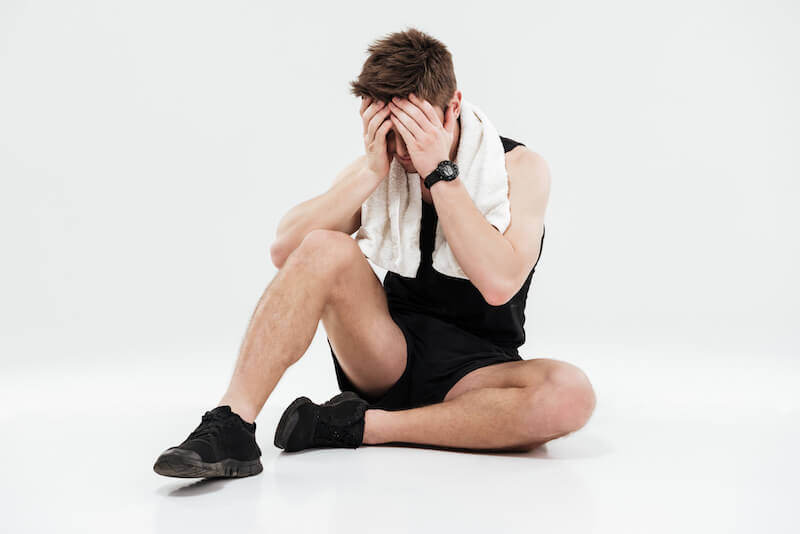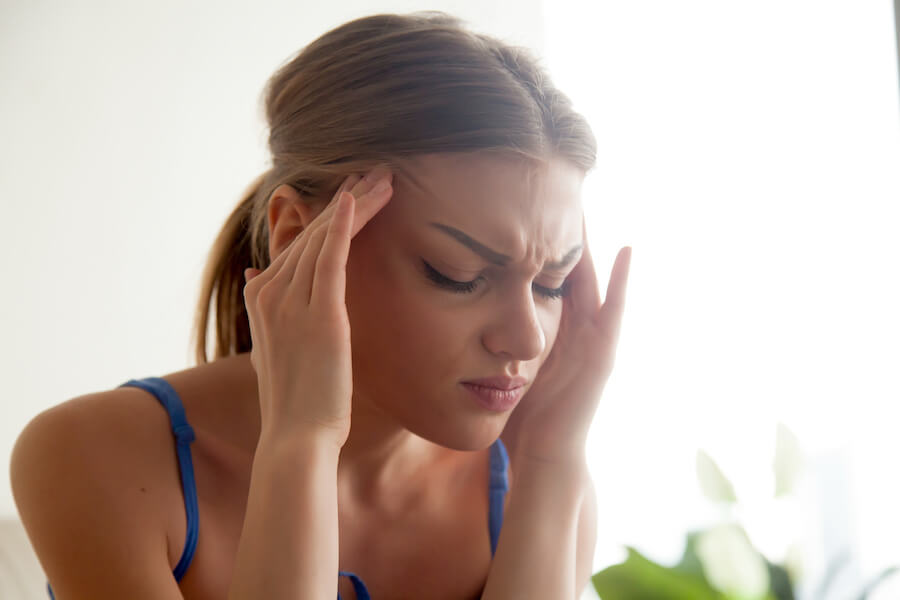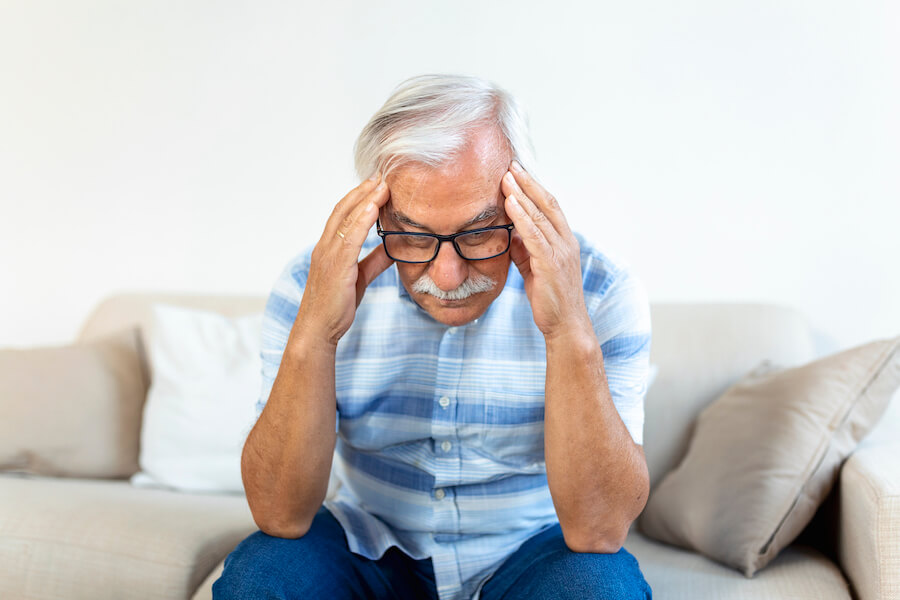Dizziness is a condition that most people have experienced at least once in their lives. It is accompanied by symptoms such as lightheadedness, loss of balance, a feeling of faintness, and a sensation of the surroundings spinning.
Frequent or constant dizziness can significantly impact the quality of life. Dizziness can increase the risk of falls and injuries and pose a danger during activities such as driving or operating machinery. Additionally, while it is usually not a life-threatening condition, dizziness can be a symptom of serious illnesses and requires investigation. The treatment of dizziness depends on the underlying cause and is generally effective. It involves the use of medication, exercises, and addressing the root cause of the dizziness.

What is dizziness?
Dizziness is a term used to describe a range of sensations, such as feeling faint, lightheaded, weak, or unstable during movement. Dizziness is a symptom that can be barely noticeable or so intense that it makes it difficult to maintain balance and perform daily tasks. Episodes of dizziness can occur suddenly and last for a few seconds or much longer. If you experience severe dizziness, the symptoms can be constant and last for several days, significantly impacting your normal life. Dizziness is one of the most common reasons why adults visit doctors.
Types of dizziness
Every sensation of dizziness can be more precisely identified as one of four types of dizziness:
- Vertigo
- Unsteadiness
- (Pre)syncope
- Lightheadedness
The clinical approach to a patient with dizziness largely depends on differentiating these various types of dizziness, as the differential diagnosis is specific to each type.
Vertigo refers to an illusion of the movement of the environment, classically described as “spinning.” The sense of movement is typically rotational—people describe it as “like getting off a merry-go-round” or “the ground tilting up and down, like being on a boat at sea.” Spatial disorientation and a sense of illusory movement usually accompany this type of dizziness. Vertigo always reflects dysfunction at some level of the vestibular system, responsible for maintaining balance.
Unsteadiness impairs safe movement. People with this disorder may say they have “a problem with their legs,” but dizziness is also a common symptom. What is common among all patients with unsteadiness is the perception that movement either causes the problem or clearly worsens it. Observing the patient’s gait and conducting a careful neurological examination are therefore necessary to assess this type of dizziness.
(Pre) Syncope refers to the feeling of impending loss of consciousness. It is often accompanied by nausea, a sense of anxiety, and even transient changes in vision. Syncope or presyncope is usually the result of a circulatory disorder or a cardiac rhythm disturbance.
Lightheadedness is a condition where you feel dizzy to the point of potentially fainting. The description provided by patients with this type of dizziness is always imprecise. Some describe it as “floating” or a sensation of “the head being disconnected from the body.” If lightheadedness is accompanied by a feeling of possible falling, it is advisable to sit or lie down to avoid injury. Dehydration is a common cause of this type of dizziness, so it is good to drink some water. If the symptoms persist, seeking medical attention is recommended.

Who can experience dizziness?
People with inner ear disorders – In this disorder, the brain receives signals from the inner ear that are not consistent with what the eyes and sensory nerves perceive. This discrepancy leads to dizziness as the brain tries to resolve the confusion.
People with neurological problems – Some neurological disorders such as Parkinson’s disease and multiple sclerosis can lead to progressive loss of balance.
Elderly individuals – The most common cause of dizziness in the elderly affects a significant number of younger adults as well. This phenomenon is known as benign paroxysmal positional vertigo or BPPV. Vertigo episodes last less than a minute and are accompanied by a sense of the surroundings spinning or falling. They primarily occur during changes in body position.
Dehydrated or malnourished individuals – The food we eat provides energy for the body’s functioning throughout the day in the form of blood sugar. Carbohydrates are especially needed to recharge the brain with energy. In the absence of sufficient energy, blood sugar levels can drop, leading to dizziness. Dehydration can also cause dizziness. In fact, dehydration can be easily confused with low blood sugar because the symptoms are similar. However, dark urine or infrequent urination are signs that can help distinguish dehydration from low blood sugar.
Symptoms and causes
People who experience dizziness may describe it with any of the following symptoms:
- False sense of motion or spinning (vertigo)
- Feeling lightheaded
- Nausea or vomiting
- Instability or loss of balance
- Feeling of floating or disoriented
These symptoms can be triggered or worsened by walking, standing up, or moving the head. Dizziness can be accompanied by nausea or be so intense that you need to sit or lie down. An episode can last for several seconds or minutes and may recur.
Causes
Dizziness can have many possible causes, including inner ear disorders, medication side effects, and neurological disorders. Sometimes it is caused by underlying health conditions such as infection or injury, stroke, arrhythmias, or malignant tumors. Dehydration or low blood sugar levels, anemia, and anxiety can also be contributing factors.
Circulatory problems that cause dizziness – Dizziness accompanied by fainting and loss of balance can occur if the heart doesn’t pump enough blood to the brain. The cause may be fluctuations in blood pressure. Dizziness can also occur after sudden standing up in individuals with low blood pressure (orthostatic hypotension). Conditions such as cardiomyopathy, heart attack, cardiac arrhythmia, and transient ischemic attack can cause dizziness. Reduced blood volume can lead to inadequate blood flow to the brain or inner ear.
Diagnosis and tests
Anamnesis and physical examination
For most individuals visiting a healthcare professional, the doctor will first conduct a thorough inquiry about their symptoms and medications they are taking, followed by a physical examination. During this examination, the doctor will assess the person’s gait, balance, and the functioning of major nerves in the central nervous system. Additional tests such as hearing tests and balance tests may be required to evaluate the condition.

Balance and coordination tests
Posturography – This test informs the doctor about the segments of your balance system that you rely on the most and which parts may be causing problems. It is performed by having the person stand barefoot on a platform and try to maintain balance under different conditions.
Head Movement Testing – If the doctor suspects that dizziness is caused by benign paroxysmal positional vertigo, they may perform a simple head movement test called the Dix-Hallpike maneuver to confirm the diagnosis.
Rotational Chair Testing – During this test, the person sits in a computer-controlled chair that moves very slowly in a full circle. At higher speeds, it moves back and forth in a very small arc.
Hearing tests and vestibular tests
Vestibular testing (vestibulometry) is a diagnostic method used to assess the function of the acoustic nerve, which is responsible for hearing and balance. A healthcare professional flushes both ears, specifically both external ear canals, with water for a duration of 30-40 seconds.
Eye movement testing. The doctor can observe the path of your eyes as you track a moving object.
Diagnostic scans (MRI, CT scans)
If a doctor suspects that you may have had a stroke, and you are older, or have suffered a head injury, they may indicate magnetic resonance imaging (MRI) or computed tomography (CT) scanning for diagnosis.
Cardiac function tests
Tests that can help a doctor diagnose the causes of dizziness related to cardiac issues include electrocardiogram (ECG), which measures electrical activity, echocardiogram (ECHO), a type of ultrasound, and a stress test that allows the doctor to monitor heart function while the patient exercises on a treadmill/bicycle or performs other types of exercises.
Guidance and treatment
Dizziness often improves or resolves without treatment. If treatment is necessary, the doctor will determine it based on the underlying cause and symptoms. Treatment may involve medication and balance exercises. Even if the cause of dizziness is not identified, certain medications and other treatments can help you better manage the symptoms.

When to visit a doctor
People who experience any recurring, sudden, severe, prolonged, and unexplained dizziness should seek medical attention.
It is essential to see a doctor if you experience new, intense dizziness along with any of the following symptoms:
- Sudden, severe headache
- Chest pain
- Shortness of breath
- Numbness or paralysis of the arms or legs
- Fainting
- Double vision (person sees double images)
- Rapid or irregular heartbeat
- Confusion or unclear speech
- Stumbling or difficulty walking
- Vomiting
- Seizures
- Sudden change of hearing
- Stiffness or weakness of the facial muscles
What you can do in the meantime
If you experience dizziness, it is best to sit or lie down to prevent injury. Make sure to drink a glass of water as dehydration can be a cause of dizziness. Avoid sudden movements when changing positions. If symptoms occur while driving, park your vehicle as soon as possible.
How is dizziness treated?
The treatment of dizziness includes medications and balance exercises.
Medications recommended for dizziness may include diuretics, anti-anxiety drugs, migraine medications, as well as those that alleviate dizziness and nausea.
Dizziness therapy focuses on balance exercises.
Head position maneuvers – A technique called canal repositioning (or Epley maneuver) often helps resolve benign paroxysmal positional vertigo faster than simply waiting for the dizziness to go away on its own. This can be performed by a doctor, audiologist, or physical therapist and involves maneuvering the position of your head. It is typically effective after one or two treatments. Before undergoing this procedure, the doctor should be aware of the patient’s condition, such as neck or back problems or vascular issues.
Balance exercises – Specific exercises that help make the balance system less sensitive to movement. This physical therapy technique is called vestibular rehabilitation and is used for people with dizziness due to inner ear conditions like vestibular neuritis.
Psychotherapy. This type of therapy can help people whose dizziness is caused by anxiety disorders.
Surgical or other injection procedures.
Injections – A doctor may inject the antibiotic gentamicin into the inner ear to disable balance function. The unaffected ear takes over that function.
Removal of the inner ear sensory organs – A rarely used procedure called labyrinthectomy. It disables the vestibular labyrinth in the affected ear. The other ear takes over the balance function. This technique may be used if you have severe hearing loss and dizziness has not responded to other treatments.

Prevention of dizziness
- Maintain hydration – drink an adequate amount of fluids throughout the day, aiming for 8 glasses of water.
- Follow healthy eating principles – consume fruits, vegetables, fish, nuts, and healthy fats.
- Avoid the use of caffeine, alcohol, and salt.
- Engage in regular exercise and balance training – exercise improves circulation and motor skills.
- Manage stress and anxiety – use relaxation techniques that work for you.
- Get enough sleep.
- Discuss therapy options with your doctor – if dizziness is caused by medications, talk to your doctor about discontinuing, changing the medication, or reducing the dosage.
Prognosis / Perspective
Factors that can increase the risk of dizziness include:
Age – Older adults are more likely to have medical conditions that cause dizziness, especially a sense of imbalance. There is also a higher likelihood that they are taking medications that can cause dizziness.
Previous episodes of dizziness – If there is a history of experiencing dizziness, there is a greater chance of it recurring.
Those who have suffered a head or neck injury may experience chronic or long-lasting dizziness. Treatment may involve a combination of medication and physical therapy. Although very rare, an ENT specialist may choose to recommend surgery.
The recovery depends on the individual’s age, the underlying cause of dizziness, and overall health condition.
Expected recovery time for different causes of dizziness
Benign paroxysmal positional vertigo (BPPV) and vestibular neuritis often resolve without treatment after a few weeks or months.
Vitiligo disappears after three to four weeks and balance returns to normal.
(Pre) syncope episodes typically last only a few minutes, and disappear by eliminating their cause, variations in blood pressure.

The importance of following medical advice and treatment plans
The most crucial aspect of creating a treatment plan for dizziness is to have a multidisciplinary approach involving a team of professionals. Depending on the underlying cause of the symptoms, experienced physicians and vestibular physiotherapists can implement a treatment plan for dizziness with good results.
Some aspects of vestibular rehabilitation may require simply adhering to protocols. If necessary, other specialists may be involved in the treatment, and additional diagnostic tests may be required.
Life with dizziness
If dizziness occurs frequently, doctors advise the following:
- Be aware of the possibility of losing balance, which can lead to falls and serious injuries. Sit or lie down immediately when you feel dizzy. Lie down quietly with your eyes closed in a darkened room if you experience a severe episode of dizziness.
- Adjust your activities and stick to a routine.
- Avoid sudden movements and consider walking with a cane if necessary.
- Protect yourself from falls in your home by removing tripping hazards such as rugs and exposed electrical cords. Use adequate lighting.
- Avoid driving or operating heavy machinery if you experience frequent dizziness without warning.
- Stay hydrated, eat a healthy diet, get enough sleep, and manage stress.
- If your dizziness is caused by overheating or dehydration, rest in a cool place and drink water or a sports drink.
- In case of severe symptoms such as fainting, vomiting, or difficulty breathing, seek medical help immediately.


